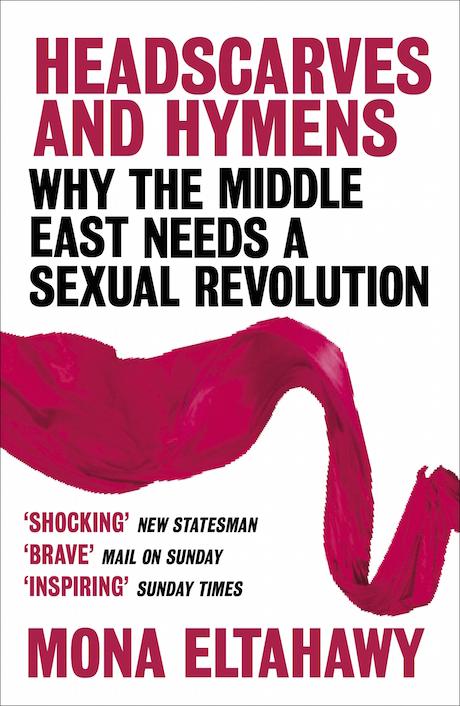Sexual Repression in Egypt (and the Middle East)

How nicely that bitch Sensuality knows how to beg for a piece of the spirit, when a piece of flesh is denied her.
---Nietzsche, ‘Of Chastity’ Thus Spoke Zarathustra
Drives denied a natural outlet will not quietly die, but rather cunningly exit in masquerade. In contemporary Egypt, on account of a volatile cocktail – unequal parts societal, political and economic – sexual repression is absurdly rampant and its expression has gotten considerably out of hand. Faced with a desperate situation at home, aggravated by a people in the grip of a spiritual crisis, and an unexemplary international context, Egyptians have chosen to cut off their noses to spite their faces by insisting upon an identity not theirs.
Much of the new morality is fanned by a kind of Islamic panic, quite foreign to the laid-back Egyptian character. One has only to witness local film stars of a few decades ago – happily prancing around in minis and bikinis – or hear rueful stories from members of past generations to know how open-minded and cosmopolitan Egypt once was.
It is the difference between a quiet confidence and a loud insecurity. By defiantly accentuating a superficial religiosity, contemporary Egyptians downplay their natural strengths and exaggerate their weaknesses. Seemingly innocuous everyday activities acquire sexual connotations, such as: the slapping of slippers on a woman’s feet, the smacking of chewing gum, or smoking of a cigarette.
The heat on an abandoned public seat, for example, is to be avoided. Wait a few minutes for it to cool before sitting, lest you are aroused by the phantom ass. Or how about this: a man goes to a sheikh and asks him if television is forbidden. Depends how you view it, replies the sheikh. To watch soccer, the man says. Alright, provided you are not ogling the players’ thighs. The supposedly hot-blooded, heterosexual male returns home and gives away his TV set. I do not jest.
Such stories are not as rare as one would hope. With the sexes increasingly segregated, when they play and where they pray, unsurprisingly the air is charged. Recently, a women-only beach has been inaugurated, presumably to shield women from the denuding male gaze. As it is, Egyptian woman opt to enter the sea, if at all, in gallabiyyas (full-length traditional dresses) – paradoxically producing a more revealing, clinging, wet t-shirt effect.
On land, things are not much better. More and more, we are witnessing single-sex lines at the cinema, market, or train station for fear of ‘inadvertent’ rubbing. On the subway, there are women-only carriages. Yet, sexual harassment, unfortunately, is rampant and random rubbing (or worse) does take place in crowded places, such as on claustrophobic public buses.

Battle of the sexes
Mutual mistrust is mounting to ludicrous proportions. Today a man cannot get away with the courtesy of holding the elevator door open for a woman. If the woman is monakabbah (veiled from head to foot in black with only her eyes peeking out, and gloved), close quarters are considered a threat. So after holding open the elevator door, the proper thing to do is step aside and let her enter alone (or with her veiled sisters). For fear of what: a frantic quickie between the ground and second floors? What’s more, even shaking a veiled woman’s hand has become an awkward proposition. Yet why envaginate one palm and make a phallus of the other? This is not religion, and certainly not spirituality.
Matters are further complicated in a culture that discourages premarital sex, and where a woman’s virginity is governed by a kind of gift shop morality – you break it, you buy it. Then, consider that serious economic difficulties prevent most couples from getting married. With female flesh under wraps, and no promise of release in the near future, sensuality spills into unexpected spaces. In Cairo, the human need for physical contact often manifests in intense same-sex intimacy.
It’s not the least bit unusual to encounter men holding hands, pinkies interlocked, hugging and kissing, while calling each other unusually sweet names: sokkar (sugar), a’assall (honey) or rohe albi (my heart’s soul). Equally common to witness men affectionately wrestling like scrapping puppies, or playfully grabbing each other like testosterone-maddened teens, well into middle age. What is at play here is not unlike what Freud terms ‘polymorphous perversity’ or the infant’s indiscriminate total responsiveness.
Prêt-à-porter religion
Tailoring religious principles to suit one’s biases and needs, liberties are assumed in interpretation. For example, while the number of girls taking the veil is on the rise, so is the artful dodge of what the idea(l) of the veil stands for: modesty. So, we get flocks of teenagers ‘fashionably’ veiled and wildly overcompensating: with faces heavily made-up, as though coloured by numbers, figure-hugging ensembles and eye-catching accessories.
Married veiled women are not without their secret pleasures, judging by the proliferation of lingerie stores in downtown Cairo brazenly displaying the kind of underwear that in other countries you’d only find in sex shops: glow-in-the-dark, feathered, sequined, transparent, you name it. And no-one blinks; the way no-one blinks in Europe or the US at seeing exposed tummies or cleavages. Yet try showing an arm or leg around here if you’re a girl or a boy, but especially if you’re a girl, and you’ll experience all the attention reserved for an unwanted visiting celebrity.

Eroticization of the everyday
El mamnua’a marghoub, the forbidden is coveted, goes an Egyptian saying. When very little is permitted, everything becomes eroticized. Take the example of a malnourished, sun-crazed soldier in heavy black uniform, guarding an embassy between naps, and leaning against a machine gun that he handles like a plough. ‘Oh boy,’ he lustily shouts to no-one in particular, ‘did you see that girl? She’ll be a rocket when she grows up!’ The girl in question is a prepubescent child, and it’s just like ‘that bitch Sensuality’ to anticipate the femme fatale in the infant.
If sex is hard to come by for most Egyptians in this forbidding climate, so is regularly eating meat on their lean incomes. Which is why calling a woman mozza, or a prime cut of lamb, is the ultimate compliment guys can conceive of paying a sexy woman. Where sex is on the mind, aphrodisiacs are not far behind. Seafood, which is also not within average means, is thought to improve potency; shrimps double up as the poor man’s Viagra (several popular sandwich chains carry ‘Viagra sandwiches’ – basically just shrimps and mayo).
Matters are complicated in a culture that discourages premarital sex, and where a woman’s virginity is governed by a kind of gift shop morality – you break it, you buy it
If there is an inherent link between food and sexuality, it is made apparent in TV commercials, where a generally starved imagination is fed all sorts of silly teases. But then commercials are the stuff male fantasies are made of, and women in ads are never more frolicsome than in the kitchen, as they feed each other between giggling fits and prepare meals for their famished and expectant husbands. Second to the kitchen is the bedroom. One emblematic ad, for blankets, features three flavours of foreign women – blonde, brunette and redhead – all writhing suggestively under the covers and inordinately happy to be warm at last.
But this is soft porn. The hard stuff is to be found on the streets. Cheap CD copies of American movies are sold on street corners, with all the hustle of porn trafficking. That’s because these Hollywood blockbusters are ‘uncut’, unlike the versions shown in movie theatres. One vendor, let us call him ‘King Leer’, plays his part overly well: laboured breathing, googly-eyed, all sly winks and nudges. It is customary for him to touch himself as he congratulates me on a ‘good choice’, or recommends one himself. I remember a family approaching him. The woman and child maintained a safe distance, with the man of the house shielding them as he bravely negotiated the bestial business of hunting a good movie.
Following the horrible earthquake in Turkey in 1999, which claimed tens of thousands of lives, one heard that this was what they ‘deserved’ for broadcasting their racy satellite TV. Another natural disaster, the 2004 Indian Ocean tsunami, was given ethical accents by local fanatic Islamists posing as disinterested scientists. The devastating catastrophe that claimed over 200,000 lives and left Southeast Asia ravaged is just punishment, we were told, for the decadent lifestyles of the Swedes (the largest number of foreign fatalities).
Confessing in code
Literature under restrictive regimes has tended to develop a flair for allegory – confessing in code, or through the use of symbolism. As Borges shrewdly notes, ‘Censorship is the mother of metaphor.’
Similarly, in repressive societies, means of indirect communication tend to thrive. Egyptians have a gift for this sort of thing. Past masters at innuendo, they deftly employ double meanings to get past the censors on stage and in life. Slyly they vent their sexual (and political) frustrations in jokes, songs and video clips that manage to hint at everything without really saying anything.
But, pent-up frustrations will have you seeing things and petty jealousies fan the imaginings of the deprived. More often than not, a feverish fantasy life and sexual projection is at play when Egyptians view foreign couples (or locals, if they dare) holding hands. Unconsciously, they embellish the picture with their own thwarted longings and desperate cravings. This applies to all activities that the average Egyptian is excluded from; so that unfortunately they cannot conceive, say, of a mixed crowd spending an innocent weekend at the beach or a night out dancing, without an eruption of dark depraved desire colouring everything.
In After Zen, Jan Willem van de Wetering’s thoughtful and humorous account of his time at a Zen monastery, we meet monks behaving like adolescents in an all-boys boarding school. ‘Girls threw rocks into the… courtyard with invitations attached with red ribbons. Monks climbed the walls at night.’ A little later, we learn from the gently disillusioned author that ‘Pam-pam was what the monks called the Western-type sandwiches I sometimes prepared in my room. The way the sliced bread got cut, buttered and smacked together reminded them of what they went after when they climbed the temple walls at night…’
Although Jan’s Zen monks and the morally embattled Egyptians are not subject to the same cultural, religious or philosophical manacles, their truths agree with each other. Which points to larger human truths, namely the incredible lengths to which imagination will go to conjure up what is forbidden, as well as this deeper wisdom, also from After Zen, ‘[that] the sex drive does not get sublimated spiritually… sexual longing is programmed into human genes; frustrate it and it becomes demonic.’